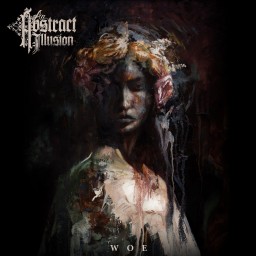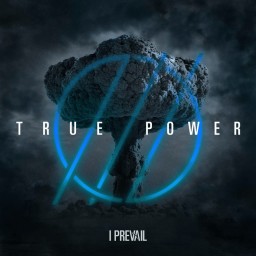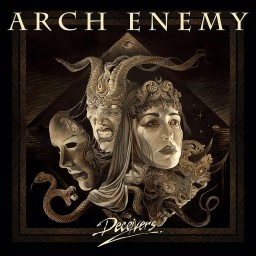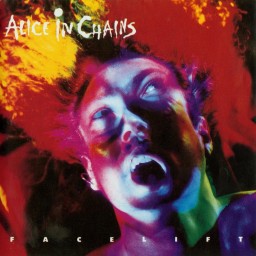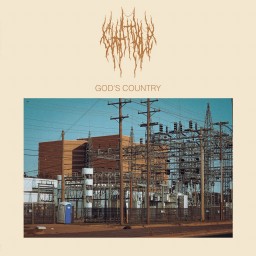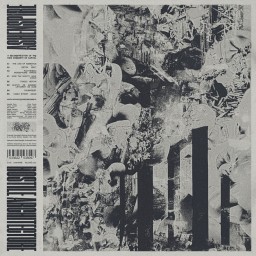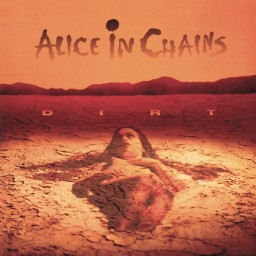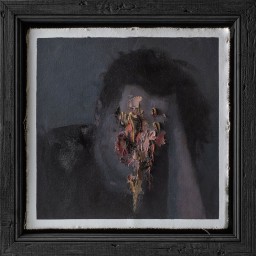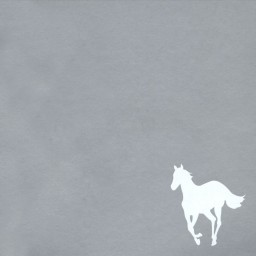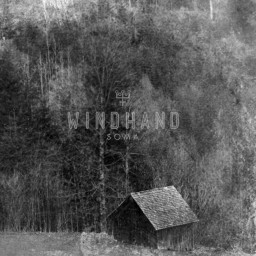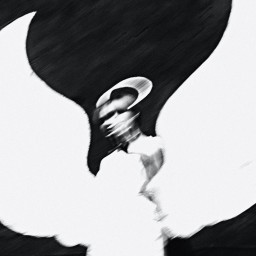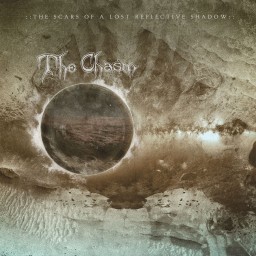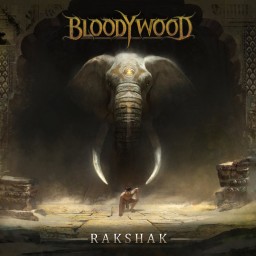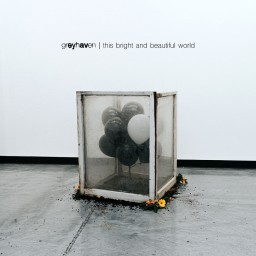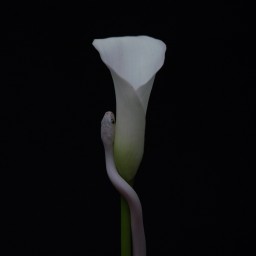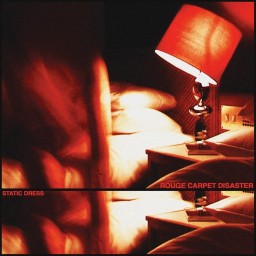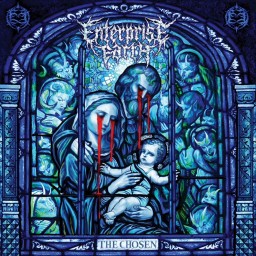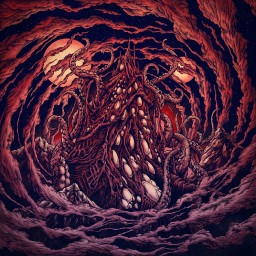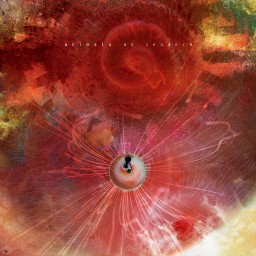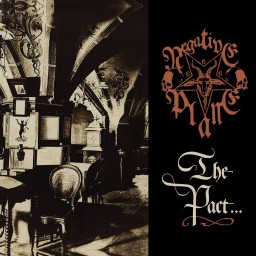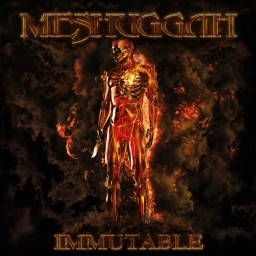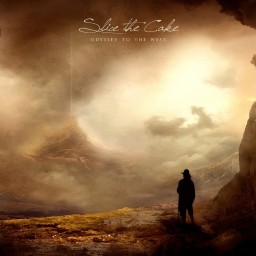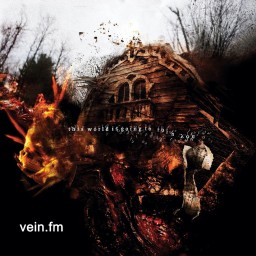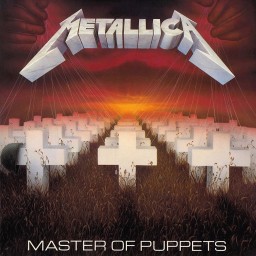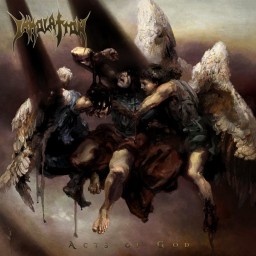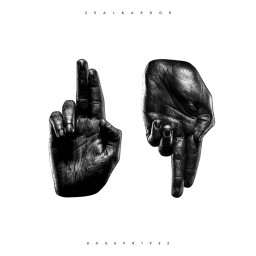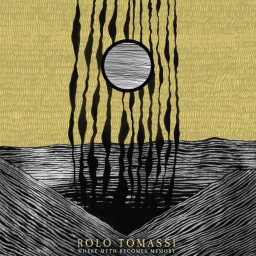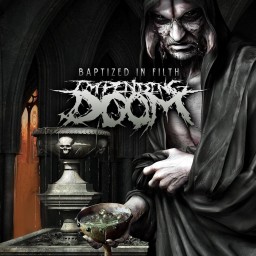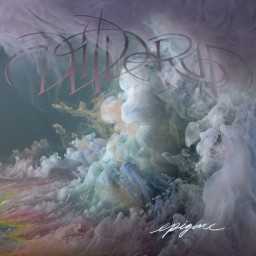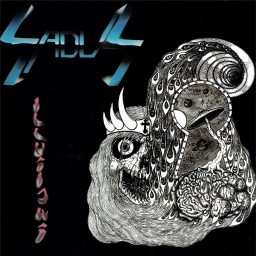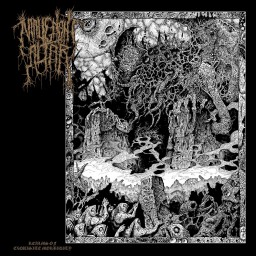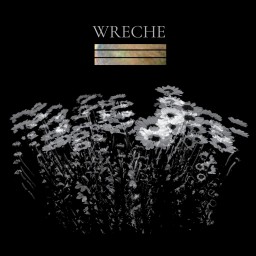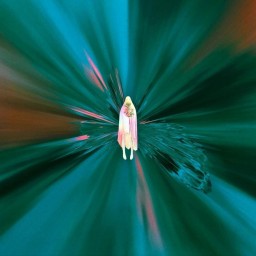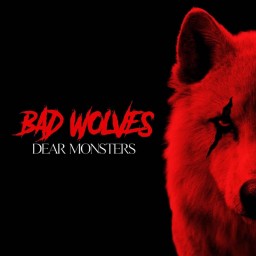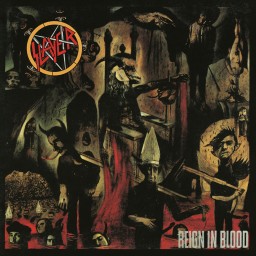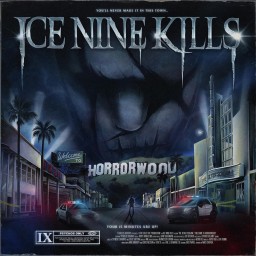Saxy S's Reviews
During my recent scrollings through RateYourMusic to see which hot new album was getting the critics panties all twisted up, I saw the newest album from The Callous Daoboys recently featured. And in all honesty, I was not really in the mood for another dose of chaotic mathcore, so I decided to find an album myself to take its place. And this album could not have come at a better time. I caught on to Swedish outlet An Abstract Illusion's debut record, Illuminate The Path in 2017 and was knocked back by how mature it sounded for a debut record. It's progressive death metal that I can only dubiously describe as "atmoshperic death metal". If you listen to black metal in the vein of Wolves in the Throne Room or Windir, or even the blackgaze trailblazers like Alcest...that might be your closest comparison point to An Abstract Illusion.
It's been a long time since that record came out and I have returned to Illuminate The Path much more than I originally anticipated. When the global lockdowns of 2020 happened, I started questioning whether we would ever get a new An Abstract Illusion album, but it's finally here! The band took their time to release some high quality prog death. A concept album rivaling Light of Day, Day of Darkness in it's ambition
The album begins marvelously with a short intro "The Behemoth That Lies Asleep" transitioning into "Slaves". It is not that dissimilar to how the last album began, and the change in pace is not forced. The intro has a short middle passage with lots of double kick pedals and open chord strumming in the guitars. That's followed by some vocoded leads, which remind me of older Between the Buried and Me. "Slaves" continues this comparison with its recurring short burst rhythm in the guitar over blast beat percussion, while the vocals try their best to match the intensity of Tommy Rogers distinguished gutturals. The bass lines are pronounced and given heavy prominence fundamentally allowing the guitars to soar above into some excellent melodies. The only gripe is the breakdown solo near the end; resorting to metalcore chugging riffs felt like a cash grab in my opinion.
Leading into "Tear Down This Holy Mountain", the listener is given a moment of reprieve following the previous track with ambience and a reverb soaked clarinet solo. The main them only begins after 90 to 100 seconds; a plentiful break before the return of the blast beats and tremolo guitar chords. The first half is a little disjointed for my taste, but the back half is where things get fascinating. Beginning with a slow guitar solo over electronic percussion is a unique choice and one I don't think works so well. Later on in the buildup, when the thick bass sustains come in, it switches back to a acoustic percussion, which sounds far more commanding.
"Prosperity" is another song with a clear divider about halfway through. The first half continues some of the BTBAM comparisons I made earlier, while the back half resembles a simplified Meshuggah track. I enjoy it's incorporation better than on the outro of "Slaves", but it drags on for too long and does not develop enough to warrant its extended runtime. "Blomsterkrans" is great; a melodically pleasing piano interlude to calm down the adrenaline that has been firing on all cylinders since the beginning of "Slaves" leading into the albums longest track "In The Heavens Above, You Will Become A Monster", and serves a similar purpose to "Viridian" into "White Walls" on BTBAM's Colors.
In regards to the aforementioned "In The Heavens Above, You Will Become A Monster", I cannot remember the last time I heard a more well constructed progressive metal song before this one. Every segment leads fluently into the next; the dynamic shifts are well placed, the tempo and style changes are built upon the previous sections, and each element connects the entire piece together into something marvelous. It is no surprise that this is the album's crown jewel, perhaps even surpassing "Vakuum" from the last album as the best song An Abstract Illusion have ever written. Which does beg the question: why didn't An Abstract Illusion put this much intricate detail into the album's shorter tracks?
Unlike BTBAM's opus, An Abstract Illusion embrace us with one final track on this album, "This Torment Has No End, Only New Beginnings" and does it hardest to live up to the sky high expectations the band just set on the previous track. This is another wonderful piece that is intricately composed and performed, leading into the albums inconclusive ending. It's potential is fully realized and ends the album in a way that makes me want more, which in this case, is not a bad thing.
The reason I continuously referenced Between The Buried And Me in this album review is because compositionally, Colors might be this albums closest comparison point. What makes it so remarkable is despite how much influence it takes from the source material, An Abstract Illusion made an album that is uniquely theirs. At this point, An Abstract Illusion have no comparisons; they make death metal by way of atmo black bands like Saor and Drudkh. Their compositional power is fantastic, their songwriting is beyond even the best of their progressive death metal contemporaries. Instrumentals are brimming with life; ranging from ebullient joy to the downtrodden of lows. The bass production is superb, the guitar solos, while plenty, are not glorified wank sessions or scale practice. When I think of progressive death metal, this is what I want it to sound like. It feels so close to perfect, but the faults on a few tracks that were ratified on others is a little disappointing. This might be the album to beat in 2022 so far.
Best Songs: Slaves, Tear Down This Holy Mountain, Blomsterkrans, In The Heavens Above, You Will Become A Monster, This Torment Has No End, Only New Beginnings
Genres: Death Metal Progressive Metal
Format: Album
Year: 2022
The new album from I Prevail has the hybrid of sounds from a number of different nu metal, metalcore and industrial elements, but is unable to coalesce these elements into anything greater than the sum of its parts. I know a lot of fans will listen to the rapping on this record and will get a little bit squeemish, but it's not all that horrible, especially by nu metal standards. Sure, the triplet flows that close out "Self-Destruction" are out of place, but that does not happen on the rest of the album. In fact, one of the albums better tracks, "FWYTYK", is billed from the start as a rap rock song with a solid build up to a mostly satisfying finish.
Stylistically, the record sounds like a hybrid of your typical Spiritbox worship mixed in with the huge eight string guitar breakdowns of a Mick Gordon video game soundtrack. When you put all of these pieces together, True Power is an album that can hit like a truck, but not consistently, and not in the moments when I Prevail expects you to get hit. Credit to the band for experimenting with sounds and willing to step outside of their comfort zone, but this is not doing it for me. I Prevail have a sound that is promising, but misses the mark structurally in more than enough ways to really hold it back from anything other than mediocre.
Best Songs: There's Fear In Letting Go, Fake, FWYTYK, The Negative
Genres: Alternative Metal
Format: Album
Year: 2022
It's hard watching a band that you once had so much favour with fall on hard times. Arch Enemy seem to have been on a descending spiral ever since Alissa White-Gluz took over as lead vocalist. Not by any fault of Alissa of course; she has filled in quite admirably for Angela Gossow. It is instead the compositions that have fallen flat in recent years. Arch Enemy have always been a band with some pedestrian song structures in the past, but at least they bothered to make each individual track sound distinct. Now it feels like Arch Enemy is trying to recapture a formula that made them popular fifteen years ago. I swear I heard callbacks to the singles on Doomsday Machine on this album at least half of the songs. Are "Nemesis", "My Apocalypse" and "Taking Back My Soul" good tracks? Yeah, but I want to hear 2022 Arch Enemy; this isn't 2006 anymore!
Compositionally, Arch Enemy have always followed the Dragonforce approach of letting the lead guitar have a very heavy foot, but here they seem less sporadic, which is a nice touch as many of the leads/solos match the tempos/styles of the songs they are associated with. The vocals can seem forced at times thanks in large part to the opening track, "Handshake with Hell". After giving Alissa the opportunity to perform some clean singing here, it's never heard from again on the rest of the album. A little bit more variety here would go a long way for this album, and Arch Enemy moving forward. Overall, it's a solid enough of an Arch Enemy record. They took their time to release following 2017's disastrous Will to Power, and longtime fans will likely enjoy it. It sure as hell won't be deceiving anyone with it's sound, which is why I'm so mixed on it.
Best Songs: Handshake with Hell, The Watcher, Sunset over the Empire, One Last Time
Genres: Death Metal
Format: Album
Year: 2022
I never thought in 20+ years that I would be reviewing an Alexisonfire album on Metal Academy, but here we are!
St. Catherines, Ontario isn't known for a lot of things; lying about ten minutes west of Niagara Falls, it's far enough away from the bustling Toronto area that many of its major attractions are a proverbial "best kept secret". That is except for Alexisonfire. This post-hardcore band have become one of this countries treasures in the rock and alternative communities, even as most south of the border associate us with Justin Bieber and Drake. Their sound can be best described as atmospheric hardcore with hints of metal thrown in as they matured. The dual vocals between Dallas Green and George Pettit sometimes remind me of the dual harmonies of Layne Stayley/William Duvall and Jerry Cantrell oof Alice in Chains albeit more contrapuntal instead of being straight harmonies.
So for the bands first studio album post-hiatus (Old Crows/Young Cardinals was released in 2009), Alexisonfire want to turn back the clock a little bit, while still continuing the trend that later albums hard with more atmospherics and slower tempos. George is screaming more on this record than the sing-scream that ran rampant on Old Crows/Young Cardinals, but I do not feel like they hit with the same intensity or bombast as they should. And I think it comes from Dallas Green of all things. Dallas has always had a smooth, grounded vocal timbre in Alexisonfire, allowing for George's to give more firepower. But here, not only are the clean vocals pushed back in the mix, but they are also swamped out with reverb and other effects that never felt this intrusive. As a result, George's screams feel cheesy and rarely fit with the tunes, even when they are the first set of vocals heard, such as on "Reverse the Curse".
This album does have some questionable moments production wise and most of them are in the mixing of the guitar. I have mentioned in rock albums reviews in recent years that the buzzy, compressed, and overall unflattering sound that has become commonplace thanks to bands like the Black Keys is inescapable, and how no one has been able to pull it off. Even Alexisonfire fall victim to this sound on some of their crossover songs like "Reverse the Curse" and "Sweet Dreams of Otherness", even though their sound is best designed for the open, wall-of-sound approach. That being said, I still enjoy "Reverse the Curse" because Alexisonfire know how to write a hook all these years later. "Survivor's Guilt", "Committed to the Con" and "Dark Night of the Soul" have wonderful crescendo's that culminate in some very nice releases. Even as some tunes (especially the closer "World Stops Turning") get me in that comfy vibe state that the best Alexisonfire songs have always been able to do, a familiar vocal motif does not let these songs turn into background noise.
I was fascinated by a new Alexisonfire record and I was not disappointed. It contains many of their classic traits, while doing enough to make it stand out from the early stuff. The albums best moments are stretched out instead of one track after the other, and even then, they do not live up to the expectations of an album like Crisis. Whether or not this belongs in the Metal Academy...since it sounds so much like previous Alexisonfire records, it's easy to just say no. This is a post-hardcore album through-and-through; a very good post-hardcore album mind you, and I hope this record will open them up to a wider, international audience.
Best Songs: Committed to the Con, Sans Soleil, Conditional Love, Dark Night of the Soul, Reverse the Curse
Genres: Alternative Metal
Format: Album
Year: 2022
A Much Needed Foundation Before The True Reconstruction
When you live in the moment, it can be impossible to tell what trends are going to kick off and who will be left holding the bag. In the year before BOTH Nirvana made Seattle a hotbed for rock, and Metallica made heavy metal cool, Alice In Chains were laying foundations for both of them. The bands debut album Facelift lays the groundwork for a grunge album with crunchy guitars, but the usage of slower doom grooves, and the vocal stylings of Layne Stayley that can sound familiar to anyone who has listened to Glenn Danzig might give you a different impression.
Right out of the gate, "We Die Young" and "Man in the Box" give off this dichotomy of sounds that are not too dissimilar from one another, but still sound very interesting side by side. One is crunchy and heavy, the other is more melodic and comforting. While later songs, most notably "I Can't Remember" has an introductory riff that sounds like it could have been borrowed out of a Slayer intro circa South of Heaven. And it's all delivered with a cleanliness that is right for mainstream consumption. The dual vocal melodies of Stayley and Jerry Cantrell are splendid and harken back to Bruce Dickinson and the classic Iron Maiden run, albeit much darker and ominous. The guitar and bass riffs are precise and do not steal the thunder from the vocals unless they are called upon, and while the percussion is a little lacking, notably that snare drum that has been thrown through a reverb grinder, the simplicity makes the limited snare usage slightly more bearable.
However the one thing keeping this record down is the lack of direction. You would think with all of these influences that Alice In Chains wears with pride that this band may find a way to be a little bit more experimental. As it is, Facelift is a very safe record as quite a few riffs sound like they are being recycled throughout the record and not in a progressive way. The record sounds good and Alice In Chains have a sound that is all their own here, but they do not have the understanding at this point that each unique song needs variety. As a result, the final third of the album becomes quite tedious and kind of boring to be honest.
All things considered, I never liked Facelift initially. In comparison to what followed, this album felt very pedestrian by AiC's standards, but over time I realized how significant this album was. An album that had so many ideas, but could not execute them properly, seems to be the only reason I can ascertain that Facelift was not THE grunge album of the 90s, and Nevermind was. Same goes for Metallica and their S/T. But those bands owe a lot of their success to Facelift; preparing the landscape for both of their monumental 1991 albums. I wonder if Alice In Chains will do some reconstruction of their own before the next album...
Genres: Alternative Metal
Format: Album
Year: 1990
The debut album from Oklahoma City based noise rock band Chat Pile reminds me a whole heck of a lot (for some reason) of the first two IDLES albums, Brutalism and Joy As An Act Of Resistance. Perhaps it is in the timbre of the lead vocals that lead to this assertion because not much else about this album reminds me of those first two albums at all. In fact, this album seems more like a hybrid of IDLES' first two albums combined with their art rock stylings of recent. And if you remember my reviews of those later albums (only on RYM), then you'll know that I found them less than thrilling experiences, especially last year's Crawler.
This is a muddy album; perhaps by design given it's noise rock roots, similar to early black midi albums, and this can work in some instances. The biggest problem is that this is more of the bog standard, political post-rock/metal album that I made note of a few weeks ago with the latest Ashenspire album. There is no song structure involved in the execution of these tracks; only free form mesh held together by some of the fakest sounding anger I've heard on a metal album since Korn. By the time I made it to the closing track, "grimace_smoking_weed.jpeg" I felt cold. Like I just gone through a miserable experience like losing the life of someone near and dear to me, but not in the "celebrate and cherish the moments that we got", but rather the feeling of sheer dumbfoundness within moments of hearing/seeing the news play out directly in front of me. This record has no click factor and is further exacerbated by terrible sounding production, mixing and performances. Sometimes this feeling can be rewarding, but here it just feels lifeless. This is an album I have no intention on listening to again.
Best Songs: Tropical Beaches, Inc., The Mask
Genres: Sludge Metal
Format: Album
Year: 2022
To be honest, I do not understand the current climate in metalcore music. Not that I find all of it to be detestable, but why certain artists get heaps of critical acclaim, but next to no mainstream attention, or vice versa. Alternative metalcore is running wild at the moment as Spiritbox, Northlane, Bad Omens dominate charts, but when I view aggregate scoring lists for metalcore in 2022, I find albums like They Fear Us by London based band, Ithaca.
And upon listening to the album a few times, I can see some potential. I think moreso than anything else, Ithaca are taking a lot of influence from fellow UK metalcore band, Rolo Tomassi. And the comparisons go beyond face value; sure they have a female vocalist who has a decent blend of hardcore screaming and softer singing, but the instrumentals also bring in some more progressive elements, such as uncommon time signatures and unconventional guitar methods. And yet I find this album pretty generic to be frank. The breakdown riffs are formulaic, while the heavier sections cannot find a consistent groove the want to play with. This album finds itself swapping back and forth between Killswitch Engage, August Burns Red and Emmure riffs without doing much to distinguish them, or bring them together. Perhaps Ithaca thought that female vocals would be enough of a stylistic change to push them out, but I just do not hear it.
The production doesn't help much either. As a metalcore album, it has a strong preference to amplify the chugging guitars and Djamila's harsh vocals. Even during the softer, post-metal interludes, bass is not allowed to breathe over the top of some very nice sounding guitar chords and clean signing. The percussion does some heavier lifting with its standard kick heavy mix, but many times those kick drum lines actually run counter to the guitar chugging, a nice touch and gave me something to really focus on during the breakdowns.
The final two tracks of this record, "You Should Have Gone Back" and "Hold, Be Held" try for a "post-metalcore" sound, very much Greyhaven in influence. And I wonder why Ithaca did not go for this kind of sound more consistently throughout the album. The song structures, while not perfect, are a lot better here than earlier on in the record. As a whole, it tries to be a number of different bands at the same time, but cannot balance them all properly, and it ends up sounding like a mess.
Best Songs: The Future Says Thank You, Number Five, Fluorescent
Genres: Metalcore
Format: Album
Year: 2022
2022 has been a surprisingly good year for post-rock so far. Perhaps this year was a bad one to finally hang up the reviewing jacket since it was, in fact, post-rock that eventually led to my departure in the first place. 2021 was such a boring year for all different styles of post-rock and adjacent music. Leave it to Black Country, New Road and foxtails in hardcore punk to give me one final hurrah at the start of this year before being swamped with a bunch of indistinguishable mush and my eventual departure.
Of course, it was likely that post-metal would have to get involved in this somehow. And since my review retirement did not include heavy metal, I figured I would give the new Ashenspire album, Hostile Architecture, a spin or two. And as much as I do not want to admit it, it is albums just like this one that distanced me from the critical world of album reviews.
Let's start off with the positives because there are a lot of them. The production of this album is splendid. This album has great chemistry between the guitars and bass lines. I personally found the guitars to sound a little groggy during the heavy chugging passages, but an album like this does not focus on metalcore adjacent breakdowns and mixing very much. The percussion is top notch, borrowing a lot from black metal with some ferocious blast beat patterns that do not become overbearing. While the vocals did take a little bit of time to get used to, I found them to be quite strong, especially with the precise pronunciation and diction. And I would be remised if I didn't mention the quasi jazz saxophone solos that appear on this record sporadically. The horns sound dark and full instead of the brighter sounds that run rampant on a number of recent metal albums, from bands such as White Ward.
But my biggest issue with this album is the content. Now look, I'm not going to come on here and bash the album for its timeliness and cringe inducing lyricism; especially sine it is coming from a political point of view that I abandoned a long time ago. But let's compare it to Ants From Up There by Black Country, New Road from earlier this year. That album was not necessarily political, but it had an arc surrounding it that was brought forth in the music. Hooks were sparse, but small vocal motifs were allowed to resonate and give them a quiet anthemic feel. By comparison sake, Hostile Architecture doesn't have motifs either, but the vocals are so flustered and all over the place that they don't provide the listener with any sort of anthemic power. To me, the vocals of Hostile Architecture sound like a sermon; a sermon that I hopelessly tuned out of as early as "Béton Brut".
There is a reason why Rage Against the Machine's music is so poignant to this day, and it's not because of the messaging. It's the timelessness of it all, plus the quick jabs during their choruses are so instantly anthemic. Ashenspire created an album here that has populism, and you could make the argument that the vocals are delivered with power, but the precision is severely lacking. I would like this album more if it was just an instrumental one.
Best Songs: Plattenbau Persphone Praxis, Tragic Heroin, Apathy as Arsenic Lethargy as Lead
Genres: Avant-Garde Metal Progressive Metal
Format: Album
Year: 2022
I think I shocked myself more than anyone else when I listened to, and enjoyed Imperial Triumphant's 2020 album Alphaville. It was technical death metal, but of the heavily avant-garde variety. It may have been the closest thing that you may possibly imagine if the term "progressive jazz metal" were to be formulated. The combination of uncommon song structures, heavily dissonant riffage, obtuse lyricism and horn instrumentation that sounds borrowed straight from free jazz is a sound that should not work...and yet it did.
And so it should come as no surprise that we find ourselves here. Spirit of Ecstasy, despite it's avant-garde genre tag, is not that far removed from the multitude of technical death metal bands with their songwriting techniques. In fact, I would define this record as being the one that most closely resembles technical death metal. And my goodness what an album it turned out to be! Spirit of Ecstasy is a more thought provoking album than Alphaville and does so by going for a sound that is still demanding, but somehow more accessible and more tuneful than ever before.
First and foremost, the jazzy fusion elements of Alphaville are lacking in quantity and are instead replaced by more classical inspired passages perhaps borrowed from the Igor Stravinsky playbook. The ending of "Merkurius Gilded", the entirety of the quasi instrumental "Bezumnaya"; these tracks are hauntingly beautiful. The heaviness of the grooves on "Chump Change", "Metrovertigo" and "Tower of Glory, City of Shame" are heart stopping. While the first real incorporation of jazzy horns takes place on "Merkurius Gilded", and the instrumental "In The Pleasure of Their Company" sounds like a free form jazz solo. All of this seems like it would be overwhelming for someone like myself, and yet Imperial Triumphant never lose sight of their identity on this record. It is quite the marvel and well worth hearing just for this.
The technicality is not meant to be used as a shield for bad compositions. Instead, it furthers them by exemplifying this records most chilling moments. This unfortunately brings us into the lyrics. And look, Imperial Triumphant have a way with words on this album that is quite impressive; resorting to high brow references instead of spelling it out for the listener. But when the words are so important to the compositions, why on earth would they be pushed back so far into the mix? I cannot see a discernable reason for this beyond "it just want tech-death bands do" and I'm not buying it.
But if you can overlook that, you will find an album of immense quality. I'm not sure how much of it I would listen to outside of a full album experience, but Imperial Triumphant are further developing their identity beyond a bog standard tech-death formula and I cannot wait to see where this band takes their sound next.
Best Songs: Chump Change, Tower of Glory, City of Shame, Death on a Highway, In the Pleasure of Their Company
Genres: Avant-Garde Metal Death Metal
Format: Album
Year: 2022
How does one discover metal in the modern day? I think in some regards, heavy metal is more elitist than some of us could even imagine even ten years ago with how wild some of it can get. While the mid 2000s were brim with the early stages of scene emo culture with pop punk from My Chemical Romance and a resurgent Green Day, my local alternative radio station (it still does) had a metaphorical boner for the early 90s and more importantly, the grunge era. I don’t need to elaborate further but just the names: Peral Jam, Soundgarden, Screaming Trees are legendary.
Of course, one would be remised if they didn’t mention Nirvana. And so here is the mention: I never liked Nirvana in the same way as those other grunge bands. I’m sure my story is not that dissimilar to many others, but I grew up in a household that was dominated by soft adult contemporary music and pop adjacent music of the 90s boy bands. So, when I gave my parents a more than reasonable excuse to listen to anything with a rock edge, and they refused, well then it became obvious where much of my attention to alternative counterculture derived from. But it stems even further than that. Everyone loved Nirvana when I was an adolescent, but I always found their music so squeaky clean and commercialized and lacked a lot of substance. To this day, I hold Nevermind as one of the most overrated albums of all time, right alongside the entirety of AC/DC’s discography. Say what you will about the over compressed mess that is In Utero, but it has some of Nirvana’s most essential tracks, not to mention their dark undertones.
I bring all of this up as preamble because you need to know exactly why Alice in Chains’ Dirt is the pinnacle of the grunge era. This record is dark, gloomy, depressive, nihilistic and sombre. And it does it all with a level of comfort that is among one of my favourite heavy metal records. Hearing Dirt by Alice in Chains must have been a similar feeling for me to how those who experienced the first Black Sabbath album must have felt.
And that comparison is not devoid of context. Unlike the other grunge bands of the 90s, Alice in Chains were not afraid of the slower, brooding song styles. While bands like Nirvana were becoming more accessible on Nevermind, and Pearl Jam were releasing Ten, Alice in Chains were traversing the pits. They were not contempt with shout-along choruses, and without that specific focus, Dirt might turn out to have more memorable chorus lines than the other grunge bands. Listening to an Alice in Chains album was all about wallowing in the sadness and the insurmountable weight of the lyrics of “Rain When I Die”, “Down in a Hole”, “Rooster” or the closer “Would?”. Unlike Nirvana, who wrote songs about…literally nothing, these words meant something very dear to our protagonist/narrator, and that emotion can be felt by at least one listener with the same intensity.
Perhaps a lack of knowledge surrounding doom metal at the time of the discovery of Dirt may lead to some contrasting opinions surrounding this album, especially on this website. While doom metal is heavily driven by melody, there is a short list of classic doom metal albums that I can recall that use the hook as effectively as this. And of course, these hooks would not be possible without the contributions of Layne Stayley. The vocals are magical in their contour and performed with an attention to detail that cannot be overstated. While calling the timbre “clean” might be accurate, hearing the solo howls during “Rooster” and “Would?” evoke a true sense of realism and gravitas. When these passages are complemented by the background vocals of Jerry Cantrell, it creates pure bliss.
Now with this being lumped in with the grunge crowd during the early 1990s, it is easy to say that the instrumental work is underwhelming. And this is probably true. The riffage is chunky and the melody is almost exclusively given to Stayley’s vocals. But it’s how the instrumental compliments the vocals that make Dirt a cut above the rest. It might not be as contrapuntal as early Soundgarden albums but makes up for that in unity. There is a sense of…completion in the composition of “Hate To Feel”, “Would?” and “Rain When I Die” that Soundgarden and Pearl Jam never had. Soundgarden would figure it out later with Superunkown, but Alice In Chains found it many years earlier.
I mentioned in my review of The Devil Put Dinosaurs Here how I felt that Alice in Chains fans were far too reactionary (I hate that word but cannot find a suitable replacement) towards William Duvall and the AiC reunion. Too many fans view this band as sacred ground and having a reunion without Stayley's corpse would be heresy. It’s very similar to the backlash received by the Star Wars sequel movies. But they all deserve a chance. And while most of them fail (Star Wars) I for one am glad Alice in Chains returned in the 2010s. But upon further analysis and revisiting this record all these years later, I must admit that the Stayley traditionalists do make a solid point: Alice in Chains is not the same without Layne Stayley. The majesty of the first two records cannot go underappreciated and its influence on the Duvall records is essential. But Dirt is more than just an influential juggernaut. It might not be the best metal album, but it is without a doubt the most important record for me. I wish I could return to those blissful days of blasting this album in my room, high as fuck, and getting lost in the world. Which begs the question: if I would, could you?
Genres: Alternative Metal
Format: Album
Year: 1992
I am far more forgiving towards Doom metal's stepbrother, Sludge metal. And in theory it makes a lot of sense why: why not combine the excellent songwriting capabilities of Doom with the exceeding aggression of thrash and hardcore punk? It's like a dream come true! Furthermore, the introduction of atmospheric sludge metal with bands like Neurosis and ISIS are huge influences in the bands that I enjoy, but even the more traditional stuff; from the Melvins and early Mastodon are excellent.
So it was nice to hear from a sludge metal band who were not about to take me on an hour long post-metal trip. But man was I not expecting this. Sure it still sounds very atmospheric; riffs such as "Those Years, Condemned" sound taken right out of a blackgaze handbook. but interspersed among doom and post-metal passages are quasi metalcore breakdowns! I cannot say I am fully surprised by this since -core has found its way into many styles of metal in recent years, especially with its current Djent revival.
Compositionally, Páthos is a progressive album with all of its style changes, but it somehow manages to keep a consistent flow all through the album. It's heaviest moments are given delicate preparation before the tremolo picking guitars, howling vocals and double bass/blast beat percussion take over. The breakdowns do not sound that far removed from the original riffage; really only diverging by replacing long sustained guitar chords with palm muted ones. The only truly striking moment was the clean vocals on "All You Will Remember". These harsh vocals are hellish, especially the highs, so bringing the album back down to earth with clean singing was a nice touch...only for the band to never return to them. These softer post-rock sections on "In Your Wake" would make excellent vocal breaks instead of becoming texture pieces.
This is the kind of doom metal album that I could vibe to unironically and enjoy immensely. However, the metalcore influences does bring its fair share of production issues. It is not worth it to go through them all, but the biggest culprits are an unhealthy dose of overproduced double kick pedals, a less than flattering low end in the form of guitars doubling bass lines instead of instrumental independence, and some less than impressive breakdowns in general. I guess they sound fine in the context of each individual piece, but throw away the progressive songwriting and uncommon time signatures during the breakdowns and its a typical 5-7-8 riff.
This record reminds me of 2018's Iris by Canadian death doom band Altars of Grief. Both are in genres that I frequent and enjoy and each has a unique sound to them that separates themselves from contemporaries. But they are both held back by production choices that have been brought over from a previous influence. While it is still unclear what will happen to my fellow countrymen in Altars of Grief, Conjurer will more than suffice to quench my thirst for progressive doom metal.
Best Tracks: It Dwells, All You Will Remember, Those Years, Condemned, Cracks in the Pyre
Genres: Sludge Metal
Format: Album
Year: 2022
I do not know if this opening statement is meant to invoke a positive reaction, but I'm going to say it anyway: the Deftones know how to create music that sounds like the inside of a hotboxed room. Coming into this album, Deftones have established themselves in the ever growing nu metal scene of the late 1990s and easily one of the styles most mature acts at that. So imagine the shock of so many Deftones fans during 2000 when tracks like "Digital Bath", "Change (In the House of Flies)" and "Rx Queen" take center stage instead of "Back to School (Mini Maggit)" or "Elite".
But I still cannot help but be completely infatuated by it! For an album that is so hazy, there is a certain cleanliness to it that I cannot comprehend how it got to this position. Yeah, some guitars on "Street Carp" and "Passenger" sound like they were twisted too much by an EQ filter, but there is some fascinating a poignant bass lines that compliment both the guitar as well as the slow but precise percussion. Chino's breathy vocal stylings are back and with a vengeance. Vocals tend to slur into one another during the records lighter moments, such as the acoustic "Teenager" and other soft verses. But the words are not emboldened with more reverb; they actually sound quite...acoustic. And that also helps the louder passages where Chino can accentuate and shout more, which are cleaner and gives the listener something to focus on.
Unlike many bands trying to evoke the drug-induced coma through their music, Deftones pull it off by actually including tunes in the songs. Repetition has always been the name of the game, but not one track on this album outstays its welcome. Each melody is unique, even as some of the albums timbre stagnates through tracks. It becomes comfortable, almost as if it could be played under any situation. It's good for working out, dinner music, relaxing and sleeping. In this regard, White Pony can be viewed as the "tune up" or as a more accessible version of Tool's Lateralus. Only fitting since Maynard appears for uncredited guest vocals on "Passenger". It might take a few tracks to really lock into a groove, but once it gets there, in the words of Chino on "Knife Prty" "I could float here forever".
Best Songs: Digital Bath, Rx Queen, Street Carp, Teenager, Knife Prty, Passenger, Change (In the House of Flies), Pink Maggit
Genres: Alternative Metal
Format: Album
Year: 2000
I must admit, I was worried about this album when I first started listening to it. Something about it's extended runtime that was not helped at all by the inclusion of a thirty minute closer. But then as I reached the end, what I found myself appreciating was those final two tracks more so than the four shorter tracks that precede them. Don't get me wrong, "Orchard" and "Feral Bones" are quite good, and the acoustic "Evergreen" was a nice change of style, but they always felt like glorified interludes; stylistically they could have been reduced in size. But then again, I could say the same thing about the albums final two tracks, but that would take away from the hypnotic atmosphere that they contain. "Cassock" has nice simmer and dynamic growth, but "Boleskine" adds a hard song structure/form to adhere to. The very monotonous and hypnotic motif modulates through the first half of the track before finding a steady ground for it to fade out over an absurdly long timeframe. The production of the guitars can be hit or miss as they do clip the mix frequently, but the fuzziness of it all gives it the impression of a stoner metal album, and fuzzy distortion like this is not uncommon in stoner music. In fact, it usually bolsters the record.
I hear the pieces of a great album, but can truly only enjoy a record such as this from a distance. Stoner metal has never really been my thing, but structurally it is far more impressive than many other albums in this style. What holds it back is the Deadmau5 approach to songwriting of using sixteen bar phrases instead of eight. Windhand could have said the same amount in a shorter amount of time and it would have been great.
Best Songs: Orchard, Feral Bones, Evergreen, Boleskine
Genres: Doom Metal
Format: Album
Year: 2013
So far in 2022, I've moved away from the high brow critic spheres and narrowed my new listening to styles/genres that I already have a vested interest in. One of those genres, obviously, is heavy metal and last month I cleared out my back catalogue of popular alternative and metalcore records that I skipped over in the first half of the year (Northlane, Bad Omens, Static Dress, etc.). But along came Thornhill who were getting much attention in critic spaces, but not so much in the mainstream. The can usually only mean one thing: Deftones.
I've been revisiting a lot of Deftones in recent weeks as well (White Pony review is coming soon). And yes, Heroine by Thornhill does emit many of the songwriting tropes that are iconic from the early 2000s era Deftones circa White Pony, as well as some more modern, popular releases like Koi no yokan and Diamond Eyes. But something about this record feels different; like a record that knows its source material down to its seams, but can build it back up with different materials and still have it fit. Djent-y breakdowns are popular at the moment, and this record does a solid job of not allowing them to feel slapdash or thrown in just for the sake of trendchasing.
The album is really dreamy and lush and helped in large part by a production that does not favour one instrumental over the other. Lots of atmospheric music fails at being so when bands give prominence to one part over the rest giving it a jarring effect that snaps the listener right back to reality. But this album's real star? Vocalist Jacob Charlton. This vocal timbre is splendid. The way in which Charlton accents uncommon syllables and releases stanzas prematurely adds a layer of roughness to this record that Deftones albums just don't with Chino's clean delivery drowned out in reverb and other effects. It's almost reminiscent of Muse's Matt Bellamy, but with much better fundamentals beneath it.
This is a great album. The Deftones elements are great and hold the original source material to its purest form, but divergences are precise and not forced. This is a name that I look forward to keeping an ear open for years to come.
Best Songs: Leather Wings, Blue Velvet, Casanova, Hollywood, Heroine
Genres: Alternative Metal
Format: Album
Year: 2022
Finding death metal that isn't of the melodic variety has become quite the challenging task in recent years. Too many times the musicians rely solely on tonal and structural dissonance in order to make the music sound as vicious as possible. But what these artists fail to realize is that being engulfed by texture and the sonic equivalent of mush may be exciting, how am I supposed to listen to this outside of the mosh pit? Without any structure, many of these songs just become lifeless. Perhaps my experience with more melodic sounding music has left me numb to the endless chugging, blast beats and breakdowns, and begging for some kind of sustenence.
There are exceptions, one such is the Daniel Corchado solo project, The Chasm. Records such as Light of the Infraworld were melodic enough to at least give a number of tracks on the album some staying power, while still not pulling any punches during the traditional death metal passages. And in 2022, The Scars of a Lost Reflective Shadow goes to show how melodic tendencies can be interwoven into heavier, technical death metal frameworks and still sound good! Although I will admit some of this record is sounding pretty formulaic for The Chasm as they try to incorporate more true progressive passages into their work.
Like with Light of the Infraworld, this album starts off with an instrumental, "Return of the End (The Ancient Spirit that Makes me Aware)", but this time The Chasm has included three unique instrumentals. The first, "The Constellations Stagger" has a pretty standard death metal groove, while the lead guitar carriers a pretty good motif, while the second "The Paths that Lead to the Abysm" is a death-thrash stomper. The guitars providing simple motifs are expected, but having some melodic foundational device gives it a momentum boost. And for a track that is one of the album's shortest that can only be a good sign.
The rest is okay. Like I mentioned earlier, this album is all ready to start dropping some progressive tendencies as early as "A Keen but Empty Sight" and they can start to get repetitive after a while as songs modulate from black metal open tremolo guitars, slow doom-y "melodies" and thrash/death palm muted guitar and skank beat drums. From a production standpoint, I enjoy how open it all sounds with the guitars not being compressed like ass and giving the bass some presence in the mix. The percussion sounds decent, except for the kick drum, which ever so slightly fade in and out of time whenever performing a double kick passage. In the end, it doesn't affect the outcome of the track, but it can be disorienting and distracting if you listen through headphones. Daniel's vocals are much improved over previous The Chasm album's as well; I once claimed them as scrappy, but here they fit the mold. Maybe a little bit on the restrained side and therefore hard to make out without a lyric sheet in front of you, but the tone is there.
I like The Chasm and this record as well. My adventure's into more of the technical side of death metal has not produced too many positive results in recent years, but The Chasm are here to fill some of that void. I wish more groups were willing to be as daring with their blending of melodic/technical soundscapes as The Chasm and Allegaeon are.
Genres: Death Metal
Format: Album
Year: 2022
This record is highly conflicting for me. On one hand, I can certainly hear the appeal and excitement coming out of this Indian nu metal act. With plenty of experience hearing oriental music in both progressive and black metal spheres, I really enjoy the specific Indian musical timbres of the flutes, sitars and various percussion. It gives this group more than enough unique qualities to stand out from any number of nu metal acts from the late 90s/early 2000s as well as the queue line of disposable acts in the modern age. I also really enjoy how these tones are used over a more traditional pop song structure instead of resorting to elongated forms of more dense subgenres. I could see this record serving as a bridging point from mainstream alternative metalcore to folk metal and later on, black metal.
On the other hand, this album can get pretty cringy at times. I think the most blatant is the rap vocals that are usually performed in English instead of the traditional Hindi that is explored throughout the albums choruses. Many of the punchlines are really embarrassing if I'm being honest. Actually, now that I think about it, the vocal performances all around are not very impressive. The main vocals sound like Slipknot's Corey Taylor as they float in and out between harsh singing and the occasional screaming. The rap vocals are more spoken than Slipknot, but that allows for the vocals to be pronounced and focused on, which as mentioned before, is not necessarily a good thing. Otherwise, the mixing runs quite flat as the bass is given next to no focus. The guitars are so bloated and blocky that nothing else is allowed to breathe.
I can tell that this record is not meant for me, even as I found myself trying to vibe with it. Maybe back in the day before I dug into the rabbit hole of folk metal I may have this more enjoyable. In the modern day, the production is lousy and the English vocals are actively distracting. Still, the usage of Indian folk instrumentation and compositions are fresh and unique. I would still recommend it just for the novelty of it all, but I hope other conventional metal bands from around the world take notes from this in the future.
Best Songs: Zanjeero Se, Jee Veerey, Yaad
Genres: Alternative Metal
Format: Album
Year: 2022
Greyhaven are attempting to fill a void that has been missing for the last five years following the final Dillinger Escape Plan album and they succeed in a mostly enjoyable way. It may be a little bit too much on the technical side of mathcore for my liking (think Every Time I Die), but this record saves a lot of its more memorable moments for the back half.
Best Songs: All Candy, Of Snakes and Swans, Fed to the Lights, And It's Still Too Loud
Genres: Metalcore
Format: Album
Year: 2022
I graduated from my post-secondary music program in 2013. I did not need this stark reminder towards all of the non-songs and guitar wankery that I had to endure during that time. This record is saved by its production and top notch performances. Even then, the performances are not as impressive this time around, but what strikes me most of all is that I cannot remember a goddamned thing about the album. To me, Parrhesia is musical nothingness; an impressive display of tones and frequencies that float in one ear and quickly exit out the other just as fast as Animals as Leaders modulate through arpeggio patterns and non-existent forms. At this point, it might be best to assume The Joy of Motion was a one off project and this band is back to their boring ways.
Best Songs: Gestaltzerfall, The Problem of Other Minds
Genres: Progressive Metal
Format: Album
Year: 2022
Given the fact that Static Dress wear this influences on their sleeve on this debut album, it should not come as any surprise that I sense a warm feeling of nostalgia here. It has elements of Deftones/Hum, Chevelle, and mid 2000s post-hardcore/metalcore Underoath. I may not have listened to Underoath back in the day, but their sound is relatively timely and can be felt in a lot of post-hardcore music that I hold in high regard today. The album is heavy with breakdowns, quasi emo lyricism, Chevelle style vocal timbre and Deftones stylings of atmospherics and possibly shoegaze on occasions.
At first I may have been a little hesitant to call this album great. And this is primarily due to a wide variety of styles and influences that it could be seen as nearly impossible to balance them out fairly, while still creating a new sound that is not completely dependent on nostalgia farming. But Static Dress pull it off very well; this record takes all these influences together to create an entirely new sound that is not only fresh and exciting, but also exhilarating. If any of the non-metalcore influences of this group peak your interest, then this record might have something new for you. Otherwise, those mid 2000s Underoath fans will have a great time with this.
Best Songs: fleahouse, Push rope, ...Maybe!!?, Marisol, cubicle dialogue
Genres: Metalcore
Format: Album
Year: 2022
I must admit, I was less than impressed by the new Bad Omens album when I heard it initially. The record has quite a drastic whiplash effect that I was not prepared for, nor did I want in my alternative metalcore album. The first half of the record is solid with bangers like "CONCRETE JUNGLE" "Nowhere To Go" and "THE DEATH OF PEACE OF MIND". But about halfway through the record, Bad Omens hit a detour and split the second half between more alt-metalcore and quasi Billie Eilish elctropop and cyber metal.
At first it was very strange as these ideas were kept mostly isolated from one another. You would no doubt hear elements of the atmospheric electronics and synths during the softer verses on the first half, but then the record throws the dichotomy out the window and produces full blown elctropop songs like "bad decisions" and "somebody else." "What do you want from me?" might be the most interesting track on the album as it goes more cyber metal. This leaves the last two tracks "ARTIFICIAL SUICIDE" and "Miracle" to close out the album on an odd note. The former is a alt-metalcore slammer while the later is a hybrid of sorts. I thought "What do you want from me?" was the hybrid to close out the album, but the last two tracks came out of nowhere and left the record feeling unfinished.
Upon repeated listens however, I started noticing other elements. Mostly production wise, where the alternative metalcore sound that has become popularized by Bring Me The Horizon makes its presence felt early. However, unlike so many BMTH clones (and even BMTH themselves) Bad Omens are pretty decent songwriters with a knack for productive flare. Sure the kick drum is overpowered and the guitar/bass independence is severely lacking, but the melodies are fruitful, the vocals don't take a backseat to instrumental wanking, and the -core breakdowns are sparse, making each one, especially on the back half with its fewer metal tracks, feel rewarding to the listener. That being said, the album runs a tad too long, the final two tracks feel like addendum's to the real closer "What do you want from me?" and leave the album feeling unfinished as a whole, and the songs "Like A Villain" and "IDWT$" are a little too cringy for my taste.
Bad Omens do not have to worry about the wrath of metal fans rejecting them for commercializing since they were already here from the start. And I appreciate the progression that Bad Omens put on display with THE DEATH OF PEACE OF MIND. It's a solid listen for alternative metalcore fans, but structural issues and a lackluster back half may keep you from enjoying it any more.
Best Songs: CONCRETE JUNGLE, Nowhere To Go, THE DEATH OF PEACE OF MIND, Just Pretend, Somebody else.
Genres: Alternative Metal
Format: Album
Year: 2022
I'm not really getting the division among critics about this new Enterprise Earth album. I've seen a few music reviewers online praise this album as an early album of the year contender, while RateYourMusic sings in unison about how many chunks this album blows. The main criticisms this album has received is how it follows the trend in modern deathcore of having atrocious production like Emmure and Brand of Sacrifice. And while those criticisms are more than justified here, in comparison to those bands, as well as Infant Annihilator, nothing here is grossly offensive. It's technical wankery for sure and the excessive use of djent breakdowns is far from ideal, but there are some well constructed tracks on the front half of the album that use breakdowns efficiently without resorting to brutality. They can also write a decent melodic hook when they put in the effort.
That being said, the record runs absurdly long and with the melodic tracks being few and far between, I found myself skipping tracks as early as the second listen. The traditional deathcore passages on "Reanimate//Disintegrate" and "You Couldn't Save Me" have been done to death and I never liked them initially. This is mid tier deathcore that isn't worth hating and would likely be better if the band stuck with what they knew. The problem? This is album number four from Enterprise Earth and they still haven't figured this out yet. If there is any reason to be hesitant on this record, it should be that.
Best Songs: Unleash Hell, I Have To Escape, Legends Never Die, My Blood, Their Satiation
Genres: Metalcore
Format: Album
Year: 2022
Black metal is still not my strong suit, despite what my recent listenings and review counter might suggest. So when I reviewed 2019's Hallucionogen and praised it as a great album, I knew that Blut aus Nord were a well respected atmo black metal act, but I was not expecting the drastic change in direction that the band has traversed over those twenty-five years. While the electronics are still undoubtedly Blut aus Nord, they have evolved over time from dungeon synth to ambient, industrial and psychedelia.
That last one is the most fascinating since the last record felt like a psychedelic trip while listening to it. It also seems to have attracted the fancy of Blut aus Nord since their new album, Disharmmonium - Undreamable Abysses, is doubling down on the psychedelics once again. In fact, one could listen to this record and call it Blut aus Nord by way of Oranssi Pazuzu!
That comparison goes even beyond the heavy psych comparison. the harmonic progression of this album is quite obtuse as well. Given the atonal qualities of songs like "Tales Of The Old Dreamer" and "Neptune's Eye", one might have a hard time believing that band did not have a hand involved with this. But Blut aus Nord manage to keep their etheral roots as these soundscapes are gorgeous! The melodic leads are not drowned out by an wacky, progressive song style or excessive percussive elements. The bass lines are not the most fruitful I've heard, hell they aren't even the most fruitful on a Blut aus Nord album, but they have some genuine heft, which is highly beneficial to this albums production since the percussion does not contain the same aforementioned weight. Kick drum is slightly overmixed, but a lot of the cymbal work is lacking. A thick underlying bass to emphasize chord or style changes compliments extremely well. As for the vocals, they are severely lacking, but the little bit of it we do get is fine enough; it's more Lovecraft-ian worship, but rather a commentary of those works rather than just a retread, which I enjoyed diving into.
It's almost ironic that Blut aus Nord released Hallucionogen around the same time another French based ABM band, The Great Old Ones, released their Lovecraft-ian work Cosmicism. To compare them is fair game in my opinion and Blut aus Nord stepped their game up here. This is a band that could release whatever they want and still get a passing grade from many music critics in the extreme metal sphere, but Blut aus Nord created the superior album here. The Great Old Ones made a great ABM record, Blut aus Nord crafted an experience with Disharmonium - Undreamable Abysses.
Best songs: Chants Of The Deep Ones, Tales Of The Old Dreamer, Neptune's Eye, That Cannon Be Dreamed, The Apotheosis of The Unnamable
Genres: Black Metal
Format: Album
Year: 2022
Progressive metal has challenges that other genres of metal do not have to comply with. And the biggest one for me has always been "how far off the deep end can an song/album go before it becomes too much and 'inaccessible'?" The debut record from out non-human overlords brought to focus the prog problem that myself and many of my music graduate class refer to as "the Berklee album". Berklee is one of, if not the most respected and revered post-secondary music program in North America and it produces some incredible talent across all genres of music. The issue is that no one who comes out of Berklee knows how to write a song properly. Animals as Leaders has the chops, but lacks any sense of dynamic growth or memorability for the listener. These records feel more like projects for the artists themselves rather than the audience.
Well in five years Animals as Leaders took these criticisms to heart and finally released The Joy of Motion. This album defines itself apart from other AAL records by incorporating melody and dynamic growth, while still maintaining what makes a record such as this the possession of Animals as Leaders. At no time throughout the record is someone not playing a consistent string of notes, whether that be in the percussion or a technical guitar ostinato pattern. What forces these songs to stand out is that these ostinato's are not at the forefront. Leads on "The Future That Awaited Me" and "Air Chrysalis" are slow and compliment the other parts brilliantly. Furthermore, the way that these leads build and mutate over time is splendid since they don't feel as if they were two separate ideas loosely tied together with silly string.
What matters most to me is that this record isn't boring. It does contain a plethora of Animals as Leaders tropes, but each track has its own unique style to it making it a much easier album to digest than the bands previous two records. Still, I noticed a considerable drop off in attention to finer details on the final three tracks after "Para Mexer". Perhaps it was proggy/djent fatigue that kicked in, but I would have been contempt after just nine tracks. They aren't bad per se, but they de feel like deep cuts, thrown on to the back of an album to pad runtime. Either way, this album is a joyous listen and the motion of head bopping is infectious.
Best songs: Kascade, Air Chrysalis, Another Year, Physical Education, The Future That Awaited Me, Para Mexer
Genres: Progressive Metal
Format: Album
Year: 2014
I think I share the same sentiment as others when they saw The Pact... by Negative Plane show up on the front page of RYM listed as a black metal album. At least in terms of what we in the 21st century anticipate what black metal is supposed to sound like, Negative Plane are about to throw your expectations out the window. This is more of a straightforward heavy metal album with some heavier elements that may be perceived as the extreme metal grandchild of black metal. But for me, this record feels more like a nostalgic trip back to extreme metal's roots, with the biggest influences being early records by Venom and Slayer.
As for the quality of the record, it does show a lot of ambition to not just be a straight clone of Venom's Welcome to Hell or Slayer's Show No Mercy. The riffage of the guitar is simplistic and does show signs of the early power metal influence on this records bookend tracks "A Work to Stand a Thousand Years" as well as "And so It Came to Pass". When the vocals stand aside, the guitars take their place with melodic leads that are not flashy. Solo's are sparse, which makes the rare transitions into those higher registers alarming and welcoming on an album that is primarily groove centric. The bass is understandably weak as many early extreme albums typically would be and lacking in rhythmic independence. It is the percussion that I find the most interesting, as it does contain an abundance of rhythmic independence from the melodic instruments. While guitars and bass remain stagnant for extended periods of time, the percussion is alternating back and forth between power metal grooves and black metal blast beats. The dynamic is striking and very well executed.
The vocals are not the best, but they do contribute where they need to. The howling fits right in with the very traditional black metal themes of the occult and satanic worship. Unlike Tom Araya, these vocals are given time to resonate with the listener allowing them to comprehend what is being said and with decent enough annunciation of the syllables. They blend well with the instrumental and do not deter from the rest of the compositions.
Structurally the album is quite flawed and right out of the gate you may have already figured out why. As the album is a nostalgic trip back to the early 1980s and the true roots of extreme metal (not the Norwegian 2nd wave of the 1990s), the blending is hit or miss. When the album tries to get a little extreme, it can sometimes be held back by an abundantly cheery guitar lead. The inverse also applies. Furthermore, the album runs quite long, leaving more than half of these seven songs feeling like they run out of steam by the end; five of the seven tracks are over eight minutes, and the bookends of this record both surpass ten. As a result, the album suffers the same issue that many modern progressive metal acts have to deal with; having too much content that isn't focused enough.
But in the end, I can't say that I hated this. The Pact... presents a very different side of the black metal landscape that is seldom discussed or given the time of day because it isn't brutal enough. It's the kind of black metal album that I imagine hundreds of elite music critics would have panned back in the 1980s, but would quickly turn around on once they witnessed first hand its influence. I don't think The Pact... will be influential in the same way that Venom or Darkthrone were, but it is quality and the nostalgia is not just for show.
Best Songs: Poison and the Crucifix, Three Turns to the West, And so It Came to Pass
Genres: Black Metal
Format: Album
Year: 2022
Mechug-chug-chuggah
Well this has been a long time coming...in more ways than one. Meshuggah are iconic in the heavy metal sphere at this point and needs no elaborate introduction; their approach to metalcore songwriting with technical song structures practically developed the djent subgenre that exists in great prominence today. The only problem with that is that I have never been able to fully embrace the no strings attached, by the book djent style, in much the same way that my appreciation for metalcore has drastically soured in recent years. My only review of a Meshuggah release on this website was just over two years ago when the single I was featured as an Infinite record of the month. And it gave me an opportunity to discuss everything that I cannot stand about modern day metalcore and djent.
And so, despite my lingering issues with Meshuggah as a whole, I decided to check out Immutable; the bands tenth album and first since 2016, just to see if this band is capable of doing anything other than stale, formulaic breakdown heaven. And... well you can see the score of this album, you already know where this is going.
And at this point, talking about what makes a Meshuggah album so boring to me is kind of infuriating because their are a lot of people who will tell me that the minimalist song structure with technical forms are what make Meshuggah one of their favourite bands. And at least from a performance standpoint, I understand that sentiment, the riffs are very simple once you wrap your head around the tempo and time signatures for each one, making it easy to reproduce. They have a hypnotic flare to them from a listeners point of view. But it's more of a "stare at this pendulum as it swings back and forth" kind of hypnotic as opposed to "losing track of time doing something you enjoy" hypnosis. Each track on this album is one riff, repeated over and over again with very little, and in most cases none at all, variation. It makes listening through the entire thing very redundant when you can predict everything that is going to happen before it happens. Each song splits its limited melodic duties to vocalist Jens Kidman and spacey guitar leads that sound less melodic and more textural. Perhaps unsurprisingly, it is the nine-and-a-half minute instrumental "They Move Below" that has one of the best guitar leads on the album, since it is not relegated to texture leads and has to maintain a certain level of memorability to subject someone like myself to almost ten minutes of djent droning! The limited guitar solos we get are also not that impressive either. Instead of having a solo with emotive presence or a climatic build, what we ended up with were...scale exercises. Just fantastic.
Is the album at least performed well? Of course it is! The precision on display here is unmatched in any metal genre. There are no moments where it feels like the album is slipping or rushing, a common issue in metalcore and djent style music as the performers build adrenaline that is fulfilled during its pummeling breakdowns. I guess that when your album is nothing but breakdowns, I guess the performer is quick to become numb to the endorphins. But that leads into another issue with this album, as well as the metalcore/djent subgenre as a whole. The unison riffage of the guitar and kick drum is so prominent in the mix that not only did they not need a bass player during the recording process, but even the vocals of Jens Kidman sound blocky and pushed back in the mix. Not that they really needed to be there since Meshuggah are not well known for their poetic lyricism, but at this point, why not just release an instrumental album? Why not call on Tosin Abasi to write some melodic leads and give these songs a breath of new life?
Perhaps it is unwise of me to review a Meshuggah album so poorly since 1. they play in a genre that I have never cared for, and 2. have surpassed legacy territory now with their tenth album and over three decade career. Minimalism can work wonders if it is executed in such a way to keep the audience engaged. It's part of the reason why I am so infatuated with atmospheric black metal artists like Saor and Panopticon. This is minimalism for people who just want to thrash out and give themselves severe neck pain. So enjoy it while you can because I'm not sure how much of it you'll remember afterwards.
Best Songs: Broken Cog, Ligature Marks, They Move Below, The Faultless
Genres: Progressive Metal
Format: Album
Year: 2022
A couple of months ago I reviewed an album by the deathcore band Impending Doom and made an offhand remark about the genre being littered around the time with disposable that had no idea how to write decent songs. The trouble with deathcore as a genre being that it combined the sporadic nature of technical death metal with the pummeling slow breakdowns of metalcore and together they never truly fit well together in my opinion. Well progressive deathcore does exist and consistently shows that these styles can be executed well together; whether it be from giants like After the Burial and The Contortionist, or relatively smaller acts like Slice the Cake.
Okay, awful band name aside, Odyssey to the West is a very good piece of progressive death metal. My initial impressions upon hearing songs like "Unending Waltz" and the opener "The Razor's Edge" gave me the feeling of a poetic experience that was similar to the post-hardcore tendencies of La Dispute, meaning that the lead instrumentals would have to do much of the heavy lifting. Well it turns out that Slice the Cake knows how to write vocal melodies as well, with the ballads "Pieces of Ruins" and "Destiny's Fool" having some great motifs and ideas, albeit lacking in some of the growth that is missing on other tracks; growth that can be fully realized on "The City of Destruction" and "The Lantern". It shows off the bands diversity and also impressive that they can pull them both off with this high level of quality.
The word of the day as is always the case when dealing with breakdown heavy music such as this is "connectivity". Far too often hardcore acts write two ideas that have no connection, whether it be through similar tempos, key changes, or melodic/harmonic motifs. I would say, in general, Slice the Cake do not have this problem. "The God of Destruction" begins with a tech-death rump, but the breakdown is introduced through the dramatic drop off in technical proficiency in the percussion instead of full on djent inspired rhythmic passages in the guitar. "The Horned God" serves as the middle of a three part suite and is the most technical of the trio. It's shorter runtime compliments the longer outer tracks and even does enough to feel like it connects the entire suite together in a fascinating way.
But that leads into the biggest issue with Odyssey to the West as a whole: it's length. This album runs at a brisk 77 minutes with four (!) of these suites, with "Ash and Rust" comfortably running the longest. When taken in a vacuum, these suits are very well done with enough variety between the movements/parts to keep the listeners attention throughout. However, I would be lying if didn't say that I started getting quite tired during the final suite, and hearing many of the same motifs regurgitated from other parts of the album. It really is the Opeth problem of writing 10+ minute just for the hell of it, but on a grander scale. Perhaps this could have been ratified through the removal of the straight ballads, because this album has plenty of down time on its own.
Odyssey to the West is an endearing listen that's for sure. I'm not even sure how well this will appeal to deathcore fans considering how little foundational deathcore is actually on display here. But if you even give this record a little piece of your attention, you can find a lot of musicianship and quality here.
Genres: Metalcore Progressive Metal
Format: Album
Year: 2016
It feels weird to hear metalcore getting heavier and more frenetic over the last five years, even as longtime giants of the genre, Converge, move in very different direction. The popular sounds of Warped Tour metalcore of the late 2000s has all but evaporated from the mainstream lexicon and replaced by more mathcore and djent tendencies. But don't think I did not notice that a lot of it has become more mature over the last decade as well. Loathe using Deftones-esque post-metal techniques was refreshing in 2020, but lets not forget about Vein. Their 2018 album Errorzone was a vicious assault on the ears and one I remember quite fondly, but remember most for its heavier subtext.
A few years later, Vein (now under the stage name Vein.fm) have released This World Is Going to Ruin You. And right out of the gate, you can tell this record is going to be strong willed. A whopping low end that may be compromised by some heavier down tuned guitars and triggered bass drum, leaving some independent bass lines feeling really underwhelming, a gripping vocal performance, and like with all good metalcore albums, breakdowns that feel connected to their melodic counterparts in each track. Although, you might not pick up on that right out of the gate, since "The Killing Womb" is the closest thing to fitting into a mathcore trend on this entire record.
Vein.fm are very competent in their shorter song lengths. "Lights Out", "Inside Design" and "Magazine Beach" are all revved up in intensity, but do not overstay their welcome, which makes them not become overwhelming. Conversely, The tracks "Fear in Non Fiction" and "Orgy in the Morgue" both have solid ideas, but consist of extended runtimes; essentially resulting in what feels like two different ideas stapled together. Which is a shame because the first half of both of these tracks are excellent, where I would usually considered them my album highlights. But because they both contain a second half which feels tacked on, it becomes harder for me to sell them.
However, both of these tracks (but mostly "Fear in Non Fiction") have clean singing vocals, which are seldom heard on this record until its final two tracks; the longest on the album and arguably most well constructed. "Wavery" has this dynamic swell that gives the feel of something post-metal adjacent, until halfway through when the clean vocals are swept away, a breakdown groove takes over and the track painfully slows down to its conclusion, before "Funeral Sound" attempts the same formula, but to far more terrifying results. I do like the track, but feel like the first of the voice messages shuts down the momentum that had been simmering leading into it.
If find this record to have more depth than Errorzone, but without the consistency. The middle of this record with its shorter songs might sound decent as Vein.fm songs, but fail to hold any weight beyond when they are sandwiched between some of Vein.fm's most well constructed songs in their discography.
Genres: Metalcore
Format: Album
Year: 2022
Climbing the Ladder of Metal Immortality...For Better And Worse
Metallica already had sky high expectations heading into 1986 following the surprisingly dense Ride The Lightning. But I don't expect that anyone who was around to experience the thrash boom of the 1980s was prepared for what was to come. Metallica saw the success of their previous album and knew that they had to take it up another notch.
The first thing that I noticed upon hitting play on Master of Puppets is just how clean it sounds. By comparison, Ride the Lightning is a dream-y album with its arguably excessive use of reverb and echo effects across the board. Vocals, guitar, drums and hell even bass manage to foam together to create an environment that is just as uncomfortable as the debut, while doing a sensational job of leveling up the songwriting capabilities. Master by contrast is a lot more controlled and clean; it has a lot of similar traits that you might hear in the modern age from metalcore acts. Cutoffs on "Battery", "Master of Puppets" and "Disposable Heroes" are executed with grace and precision.
From a songwriting standpoint, I have yet to hear a thrash metal album that values melody, hooks and drive as much as Master of Puppets; a large reason why it is held in such high regard even outside of the metal community. "Master of Puppets" may go down as one of the greatest heavy metal songs of all time despite its runtime; with its iconic main chorus, calming bridge and the way in which this band is able to effortlessly modulate back to its primary motif is one that deserves the utmost praise. Beyond that, the rest of the album is just as solid, even if it does have more than a few progressive tendencies. Such as the excellent ballad "Welcome Home (Sanitarium)", another long song structure on "Disposable Heroes" and of course, one of the finest heavy metal instrumentals you will ever hear on "Orion".
I think it should go without saying at this point that despite their drastically different sound palettes, Master of Puppets and Slayer's Reign in Blood are practically inseparable. I have already spoken at length about Slayer and how they developed a sound for heavy metal that was unfulfilling as part of a musical composition and was more interested in aggression, speed and intensity. Master of Puppets has plenty of all of these things, but also makes it worthwhile by incorporating it as part of a unified collection of ideas and themes. It's a large party why I think the album closer "Damage, Inc." is the albums weakest track; feeling closer to a thrash metal aggressive rump than a well constructed idea.
This actually brings me to another compliment for this album that I had never really grasped until recently. Master of Puppets is the true "transition" album. Sure, Metal Academy darling, and onetime favourite Metallica album of mine, ...And Justice For All has plenty of the cleanliness of Master, but without the well engineered sound design that left the album feeling "dry and sterile" according to Steve Huey. I personally believe it was because Lars never liked Jason Newsted (it's not like it would be the first time a band treated its bass player like a second class band member Slipknot), but I digress. Getting heavy metal to a wider audience is no small feat; it takes a lot of time and patience. Metallica were not about to start becoming dad rock just yet, but the simpler song structures, despite their lengths, cleaner sound design and a more welcoming mix lured folks in like lemmings, and once the gang was all assembled, Metallica could go the commercial route. It would cost them some of their identity, but it did exactly what it was intended to do and for that, I am eternally grateful.
I realize most of this is anecdotal, but I am sure that a lot of newer heavy metal fans can relate to my story with Metallica and Master of Puppets in particular. Heralded as the greatest metal album of all time (right alongside the first two Black Sabbath albums) and a monumental achievement for a genre that desperately needed a spark so that it would not fade away prematurely with its lack of innovation or commercial success. Any gushing that I give this album will only get lost at this point amongst a sea of similar praise. It is undeniably an unconventional way of approaching things, but this album is deserving of legendary status.
P.S. Just for the record, Ride The Lightning is my personal favourite Metallica album.
Genres: Thrash Metal
Format: Album
Year: 1986
I was generally favourable to Immolation when Here In After was featured in the Metal Academy challenge last year. And rightfully so; for a band that was important to the technical death metal scene during the late 90s, it was impressive to hear how much focus there was in those songs, to go along with some great songwriting chops and melody. It was with this information that those who were a lot closer to Immolation saw Here In After as a red herring; still good, but the polish was not to many metal fans taste.
So going into Acts of God I had no expectations and I got a solid dose of technical death metal with some more solid production, while still maintaining the sheer brutality that technical death metal is known for. However, for a band this chiseled and established in the scene, I cannot really find all that much to get excited about. This sounds very comfortable and safe, but in the style of Close to a World Below instead of the more melodically driven albums. But it does not need to be pushing any boundaries at this point. Longtime Immolation fans will surely enjoy it, while newbies can certainly find some ideas that make this band stand out from other death metal acts.
Genres: Death Metal
Format: Album
Year: 2022
This is my third attempt at a Zeal & Ardor album and honestly I’m surprised I haven’t found them remotely enjoyable. I’ve always seen myself as respecting them from a distance in how they blend blues rock and spiritual with avant-garde black metal, but never understanding the execution; it’s very hit or miss.
So for this new self-titled album, Zeal & Ardor have further stepped outside the box by bringing in more electronics that coexist within an industrial framework, while the cleanliness of some of this records hardest hitting sections are right out of the Meshuggah playbook of metalcore/djent. And, one again, this mish-mash of timbres and styles could work together so much better than they sound here.
Let’s get this out of the way fast: the metalcore elements suck. The prim and proper cutoffs of “Death to the Holy” and “Erase” just do not add up and weigh the entire track down. Not helped at all by a full helping of bass drum that swamps out everything. When this band is able to show off some black metal chops with these sprawling instrumentals, it brings the tunes as well as the vocals to life on “Emersion” and “Götterdämmerung”. The Alice In Chains inspired “Church Burns” was a welcome surprise, if only for it’s catchy vocal melody, and “Golden Liar” has a genuine simmer to it that grows and builds, but never eclipses and reveals its big climax, a show of restraint that this album has quite an issue with showing.
Honestly, I was expecting a little bit more focus on the spirituals that previous albums have. However this time they seem to play second fiddle to all of the metal escapades. Most of the time they feel out of place and not incorporated very well into their respective tracks, almost as if they were meant to be dramatic interludes before the next breakdown hits. In the end, the self-titled Zeal & Ardor album is kind of a mess.
Genres: Avant-Garde Metal
Format: Album
Year: 2022
It should not go without saying that I have never been the biggest fan of the sporadic side of metalcore known as mathcore. Now that might seem weird considering my favourite metal album of last year was a metalcore album, but those seeds were planted a few years earlier with Rolo Tomassi. And what gravitated me towards Time Will Die And Love Will Bury It more so than any other Rolo Tomassi album was how well it blended its post-metal elements with the frantic mathcore compositions. As a result, that record rightfully earned its place among the best albums of 2018.
And so, when I saw Rolo Tomassi were going to be making a record with a lot more post-metal techniques, surely I should like this album even more right? Well it’s kind of a hit or miss scenario. Having more tunes in a style that I am more comfortable with and enjoy with more frequency is all well and good, but considering how Rolo Tomassi were so integral in my appreciation for metalcore, to drop it entirely is a bit of a letdown.
And it bothers me the most because not much has changed in the years since. Lewis Johns is still the bands primary producer and knows how to mix this band properly; the synth timbre is excellent, the guitar and bass sound pummeling when they have to be, and it all compliments the wonderful voice of Eva Korman (both singing and screaming). The percussion is a lot less active this time around with fewer technically demanding passages, which does contribute to its accessibility and could be viewed as a disappointment by those expecting a return to the hardcore sounds of yesteryear.
Part of it is how the frantic mathcore passages were given so much more bombast in comparison to its shoegaze sections that felt less like musical interludes, but rather part of the whole experience. Whereas with this? I assume you have to be in the mood for some moody, albeit very beautiful, post-metal. Rolo Tomassi are very good songwriters and Where Myth Becomes Mystery has some legitimate great moments. But they are only limited to moments.
Genres: Post-Metal
Format: Album
Year: 2022
Deathcore played a minor role in my formative years. Even though I never turned out to be a huge fan of it, I know plenty of people who were in the same metalcore circles as me who were able to use this new found trend as an excuse to get on board with the unfiltered, heavy as fuck world of technical death metal. As they moved in one direction, I found myself getting more into Djent with bands like After the Burial and later Periphery.
What I never understood from this new crop of bands was how disjointed it all felt. Even more so than it's two original influences. Something about the blistering fast tempos, preceded by a whiplash tempo change to a disgusting breakdown never flowed with me. Which leads up to Impending Doom, a band who were left behind by the metalcore community, even if I will admit, their earlier discography is probably the most consistent in the subgenre. Their fourth album, Baptized In Filth continues in the same trend as those first two albums with a heavier focus on melody. Well maybe that's an overstatement; it's still deathcore with a heavy emphasis on breakdown and atomic drops, but "Murderer" and "Deceiver" have strong shout choruses to go along with the groovy as hell breakdowns that anchor it all together. The final track "Death. Ascension. Resurrection" may as well be a melodic metalcore song!
Impending Doom also have the ability to bring songs down in tempo for those breakdowns with conviction rather than resorting to whiplash. "Chaos: Reborn" is a good example of how breakdowns can be implemented as part of a whole, making it much more effective. It also allows for the track to retain its identity, an issue seldom addressed in tech death or metalcore!
With all of that said, the record is quite basic in construction. I mean, I was never going to fall head over heels for this purest form of deathcore; atomic drops that disjoint the mix in preposterous ways, same-y vocal delivery for every track that never deviates, formulaic instrumentals, and breakdowns that rely more on odd guitar techniques (pinch harmonics, scrapes, etc.) than any motif or idea. But once again, I am approaching this from a very different place than those who actively listened to deathcore during the late 2000s.
As it is, if I was ever looking for a brand of melodic deathcore that didn't require me to throw on my pretentious pants and just wanted to enjoy some simple, arguably stupid, moshing fun, Impending Doom is a good place to go. When metalcore got more dank, they added the one thing from tech-death that I never wanted in my metalcore music: musical nothingness. Baptized In Filth is not going to impress anyone who knows this sound, but at least it's memorable.
Genres: Metalcore
Format: Album
Year: 2012
It may be surprising (hell it was surprising for myself) that an album that I listened to during December catchups back in 2019 would top my list of the best metal albums of 2019. But that’s what happened when Wilderun’s Veil of Imagination beat out year long contenders Saor and Cult of Luna. Going back and listening to the album again in preparation for Epigone, I realised that there were some mistakes that I may have overlooked in the name of artistic development; mostly in regards to how Wilderun attempted to include too much content at a given time…the exact opposite songwriting technique that Cult of Luna’s album used.
But this new album was only four “songs”, and allowed for Wilderun to narrow in on what they wanted. And I think they managed to pull it off with mostly positive results.
What I really enjoy about Epigone is the compositions. Wilderun are a more than capable group that can use tools from varying subgenres and make them work in a hybrid style. The Opeth worship is obvious on “Identifier” and “Distraction III”, the use of a full symphonic palette is implemented to its full potential, and even going so far as to include some excellent death metal grooves on “Distraction II” and “Passenger”. But here’s the issue once again: while it all comes together sounding epic, it feels like there is too much stuff happening. As a result, the Opeth/black metal passages with open guitar chords suppress the orchestration. Add the lead vocals on top of that and it can become overwhelming. It's the same problem that I have with even the best in Emperor's discography. In all honesty, the symphonic elements that happen during the quasi-death metal passages are the best on the record, because the guitar is relegated to rhythmic chugging while the strings and horns take the lead. The leads are great on “Woolgatherer”, “Passenger”, ”Distraction II” and “Distraction III”. These tracks feel connected by growing and falling with the direction of the lead and where the lyrics take it. Where “Woolgatherer” falls off for me is that it sounds like two different ideas stitched together around the seven minute mark.
Production is solid…mostly. Beyond the aforementioned hodgepodge of instruments, the hushed instrumentals on the intro “Exhaler” and the softer sections of “Woolgatherer” and “Distraction III” are excellent. The album also does not have any distorted audio hell moments that “The Tyranny of Imagination” had. Unfortunately, the prog metal “problem” of the synths sounding like ass still persists, but is the most egregious on “Identifier”.
It did take a while before this album began to click with me, a very different tale from two years ago. This album feels darker and less optimistic about its future and that is displayed through its bleaker sounding instrumentals. They are still very ebullient, and I do like it in comparison to other Opeth worshipping prog bands, but structural issues within each track make it a harder sell for me.
Genres: Progressive Metal
Format: Album
Year: 2022
Sadus need to slow down if they don't wanna get pulled over by the cops!
In all seriousness though, Sadus' debut record Illusions is one that tries to do too much in the name of progressive thrash metal, but misses the mark by having some of the worst framing I've heard in a late 80s thrash metal album. Songs will sporadically change tempos, forms and styles on a whim with nothing to suggest there was even a hint of a through line considered in the writing process. Every song begins with a moderate groove and may turn into something great, but without warning the tunes deviate into this blistering fast thrash groove that is persistent throughout the track. The intro's are rarely referenced again, either lyrically or thematically and it makes them feel like Sadus just wasting our time.
The production is clean and you can hear every single note played by the guitar, percussion and even bass. And while I am a little more lenient towards unbridled noise collages by the lead guitar solos in this thrash metal style, the vocals sound fucking atrocious! It's everything that I hate about Tom Araya's slurred vocals on the first three Slayer album's, but on a line of blow. There is zero diction to the delivery. I could perform the vocals on this record with the same level of proficiency on the day I had my wisdom teeth pulled out and my mouth was filled with cotton swabs.
I think that in 2022, with bands like Vektor now apart of the lexicon of tech-thrash, I have become increasingly intrigued by the tag of that subgenre as being more progressive. However, like with death metal, that might not always be the case. This is bog standard thrash metal that is propped up only by some cleaner production than its contemporaries. Those opening grooves at the beginning of each track make me hopeful that Sadus might do something unique, but every time it just goes back to the same idea as before. For me, Illusions is the equivalent of a restaurant with good food but horrible service; you may ask yourself why you don't go back to that place on the corner as often because the food is really good, but then you meet the people who work there. And in this case, I continue to fall for it nine more times. When will you learn your lesson?
Genres: Thrash Metal
Format: Album
Year: 1988
I once again find myself in an unusual position to end another year with me reviewing an album in a subgenre that I rarely partake in. Last year it was Sunami and beatdown, this year I find myself partaking in a little OSDM revival.
Malignant Altar debut full length record is one that took me aback at first. The record is heavy with its pummeling guitars, drums and guttural vocals. But something about this album does not feel as disjointed as so many revival OSDM bands seem to resort to. For starters, you'll notice a significant drop off in the excessive use of blast and skank beats. The grooves are much slower and the band use their time to expand upon riffs and motifs. These tunes feel like they have been given a purpose beyond the bog standard "play really fast and then, suddenly, breakdown" mentality that plagues modern metal/deathcore in addition plenty of other breakdown heavy subgenres. Tunes stand out from one another to a point as "Usurping the Pantheon Crown" and "Ceremonial Decapitator" take advantage of the extended runtimes.
Unlike many death metal albums I have reviewed in recent months, this one actually has some bass presence to it and the instrumentals have a pronounced thickness to them that cannot be understated. Even as some of the more "technical" guitar passages sound flubbed and stitched back together, it is the bass that brings those chugging riffs back into place. As well the percussion is locked in with the bass and very little of this album sounds like it's falling apart at the seams. I do think that the cymbals (specifically the ride) are mixed a little too heavy as the resonation does get in the way of the rest of the mix. The filthiness of the bass breaks on "Ceremonial Decapitator" and the closer "Rite of Krause" cannot go overlooked.
Beyond that, most of my issues with this brand of OSDM still do apply. Even though the riffs themselves stand out between tracks, without a true melody linking ideas together, it can get quite frustrating listening to this record and wondering where one track ends and another starts. Similarly, many of the transitions between ideas on tracks sound cool at first, but by the time you reach the end of the album, you can already tell where each track is going to go based on what musical trope the band decides to pull out of their magic hat. At the end of the day, this record will not be taking Dead Congregation's spot at the top of the throne anytime soon, but if you want a OSDM sound with an emphasis on doom metal, you can do a lot worse.
Genres: Death Metal
Format: Album
Year: 2021
Someone must have been listening to Kaatayra recently.
Wreche is an Oakland based solo black metal project that replaces the guitars that one would expect in this genre with piano and synthesizers. This is a strange yet very interesting project that I quite enjoyed, but it does certainly feel like a niche idea at the moment and Wreche needs to work on a couple of things in order to make this more accepted as well as enjoyable.
I really do like the incorporation of pianos as the primary chordal instrument on this album, however it does take quite some time before the mixing really starts to work and flush out into a full mix. And that’s mostly due to its low end feeling gutted most of the time. Far too often the bass is relegated to the low end of the piano, while a heavy loaded percussion element bogs down the fundamental riffs. When the synthesizers are implemented on “Severed” and “The Darkling Thrush”, the fundamental bass lines are thicker and muddy up the mix in a good way to help emphasize the unsettling chord changes.
The vocals are very distant and practically inaudible in most portions of the album, but I feel like this is attributed to the themes of agony and inevitable doom that are quite common in modern black metal, plus these themes are so well constructed in this avant-garde storytelling so I cannot be overly critical. I think that this album has some solid moments that are unlike anything you will hear in black metal this year, but the choice in production keeps this album back from greatness. A couple of tweaks here and there could turn this into essential listening.
Genres: Avant-Garde Metal Black Metal
Format: Album
Year: 2021
I do not hate metalcore, but I am sure getting sick and tired of these metalcore bands with their half-assed song forms. These bands are less interested in the journey, but rather the destination. And that destination is breakdown heaven. For me, breakdowns mean nothing if they do not adequately prepare you for the sheer destruction that awaits in the mosh pit. Silent Planet is comfortably playing into this mold and coming up with new things to say about it is kind of boring.
The best I can do is that some of the post-hardcore elements on “Second Sun”, “Terminal” and “Till We Have Faces” show a group that at least knows how to write a good song with a good melodic motif, and use it for musical development, which includes breakdowns. The rest of the album is littered with same-y sounding, djent adjacent metalcore with no connectivity between the ideas. Many of the post-breakdown moments feel like interludes rather than development of ideas and are isolated from the main attraction, leaving many songs feeling unfinished.
The production does not help as the bass lines are completely swamped. The high treble in the kick drum, the down tuned guitars and the glitchy electronics are so heavily prominent that it feels like they are competing for attention. Without the bass presence, these breakdowns feel even less developed. The vocals are alright; very Jordan Dreyer-esque but with a far greater and pronounced howl for this brand of metalcore.
Iridescent is an album that is not as large as it thinks it is. It tries to be intrusive with a heavy emphasis on electronics, and goes for broke with the heavily down tuned guitars, but Frontierer’s Oxidized was both more intrusive and more dank than this by a considerable margin earlier this year. This feels a lot more grey than it should.
Genres: Metalcore
Format: Album
Year: 2021
I never would have guessed four years ago that I would be talking about a Bad Wolves album. My introduction to this band was their god awful cover of the Cranberries "Zombie" in 2018, and I felt I had every right to steer clear of these Five Finger Death Punch wannabe edgelords. Well the time has come, and it seems like it may have been at a decent time as Tommy Vext is out as primary vocalist. Their replacement is frontman of deathcore act The Acacia Strain, Daniel Laskiewicz.
And while Daniel is significantly more impactful on the microphone, it does not change the fact that this is still a Bad Wolves album. This group has a horrendous sounding mix; the compression in the breakdowns to songs like "Classical" and "On The Case" sound like liquid ass. I had a similar problem this year with Spiritbox, but that group managed to salvage the radio friendly compression by having very sticky refrains. Bad Wolves has good refrains, probably the best in the entire discography, but they are nowhere near as plentiful as Spiritbox. "Wildfire", "Gone" and "House of Cards" are good, but "Springfield Summer" and "Classical" are quite forgettable. And that's before you even get into the cringe on "Comatose". Text abbreviations? 🤢; I didn't know I could hate anything more than "Zombie", but here we are!
The compositions are fine, I guess. They are pretty predictable since this is radio rock/metal, and the promo singles "Lifeline" and "If Tomorrow Never Comes" are adequate. The biggest problem with Dear Monsters is that is the entire formula for all twelve tracks. Some songs are heavier, some songs are softer acoustic ballads like the closer "In The Middle". But these differences are all surface level. I don't like using the term "butt rock", but if any band fit into that mold, it would be Bad Wolves. It's super generic, the mixing is hot garbage, and the growing maturity in the lyrics may be commendable, and the new vocalist is an upgrade, it does not hide fact that most people who are going to enjoy Dear Monsters are never going to hear it. Instead, it'll be "get out those Monster EnergyTM and lets punch some drywall, YEAHHHHHHHH!!!" as Kyle blasts "On The Case". It'll have it's audience, but the only "Monster" I'll be is to this bands fanbase.
Genres: Alternative Metal Groove Metal
Format: Album
Year: 2021
The Metal Conundrum
It has been thirty five years since what is undoubtedly the most important year in all of heavy metal, as Metallica and Slayer both released iconic records in 1986 with Master of Puppets and Reign in Blood. It also saw a cultural divide in heavy metal that, while not apparent at the time, would become commonplace in heavy metal during the 1990s and beyond. That fissure would eventually be referred to as “the loudness war” during the late 2000s, but I propose that it began here, on 7 October, 1986.
Now for context, Reign in Blood was not the first record to experiment with heavier tones and a horrible production budget. Metallica’s debut record, Kill ‘Em All, Slayer’s first two records and Possessed’s Seven Churches all fell victim to this. And got in the face of the hook driven hard rock and metal that was coming out of the United Kingdom (Judas Priest, Iron Maiden, Deep Purple, etc.). But then March ‘86 came around, and that Metallica band had just released Master of Puppets, which proved that thrash metal could be more than just blistering guitars, face shredding solos, while still maintaining its sonic edge over power and speed metal. It was a record that was produced to near perfection, the hooks are enormous and the variety in the band's sound was impeccable.
October of ‘86 was also significant as it produced Reign in Blood. And this album sounds very different from Metallica’s record even though they are both technically labeled as thrash metal. For starters, you will notice a drastic change in tone as Slayer incorporates E-flat standard guitars instead of the traditional E natural. Right out of the gate, the album sounds darker and heavier than other heavy albums, as the chugging zeros invoke a key center that is still very uncommon to be performed in. These keys are very commonly used to imply being otherworldly, major for heaven, minor for hell.
When the opener “Angel of Death” begins and you hear that howl from Araya, you expect to be hit with a cinder block while the gates of hell open up directly below your feet. And if that is what Slayer were going for, then mission accomplished. “Angel of Death” is ferocious, pummelling and destructive, the bridge is calming, but still maintains its intensity, and the solos from Hanneman and King are ridiculous as they defy scales and just blast off into whatever dissonant notes they can imagine. Hell, I’m sure these two don’t even imagine their notes; they probably just slid their hands across the fretboard of the guitar and whatever sound came out is what they got!
All of this got me really excited to hear the next track and what would come next...only to find out that the “Piece By Piece” main riff has way too much in common with the opener. After a triplet intro, it resorts to tremolo picking, Araya rap shouting, Lombardo’s skank beat, and the key-less soloing. “Necrophobic” is all of that but double time to match its shorter runtime. “Altar Of Sacrifice” begins with an “Am I Evil?” intro, then returns to the same beat ad nauseam.
By the time “Criminally Insane” comes on, I’m genuinely pleased to hear an actual refrain in the guitars interspersed between Araya’s inaudible vocals. Which does lead into another big problem this album has: the production. This record is produced by Rick Rubin. This producer is most noted for his work with Hip Hop artists LL Cool J, Run-DMC and the Beastie Boys. The last two of those should be intriguing because of their obvious rap rock leanings. In those cases, he had artists that could enunciate their words, and if not, they could always go the way of an instrumental break. Meanwhile, Araya produces the equivalent of word vomit just spewed onto the page, which is drowned out by the band's incessant need to play as many notes as possible in as little time anyways. And this occurs for the entire record! It’s even more insufferable when Araya cannot even keep up with the blistering tempos.
Now, none of this on its own makes an album bad. What makes heavy metal so great (following Reign in Blood) is how dissonance is used as a tool to create uncomfort to the listener and in turn, give the feeling of anger, hatred and in some cases, satanic emotions. And Slayer has that locked down. Far and away the discomfort of this record is unlike anything in metal at the time and helped pave the way for the eventual rise of extreme metal, or in another term, death metal. But here what irks me the most: it is not used as a building device. Every track on this record (with a few exceptions), has the exact same timbre with no room for development or growth. Which in hindsight sounds ridiculous for me to say, since the final three tracks on this album are the best of the bunch. “Epidemic” has some catchy guitar leads, even if they do sound similar to “Angel of Death”, “Postmortem” has a nice change of pace groove before transforming into another skank beat assault. And “Raining Blood”, of course, has the most iconic guitar lead and “bang yer head” breakdown in all of 1980s thrash.
It is hard to imagine extreme metal without the contributions of Slayer during the 80s and this album in particular. And while for a time, this was far beyond the realms of what anyone considered accessible music, as decades have passed, the necessity of an album like Reign in Blood has been lost on me. With Sepultura and Kreator both managing to copy this record's formula with far more variety, I find this record to become less essential.
Which will inevitably bring me to the ultimate conclusion of this review. Slayer’s Reign in Blood was never meant to be commercialized. With its raw sound and lacking any sort of hook/motif to make these songs stand out from one another, it just sounds like musical nothingness. Araya being unable to keep up with the blistering tempos is not a show of DIY mastery, it sounds like he’s running out of breath. Not having any hooks is not a display of breaking boundaries, it's a surefire way to make sure that anyone who listens to your album cannot remember a single thing about it after its conclusion. “Oh yeah I love that one Slayer song that goes ‘brrrrrrrrrrrr buh buh brrrrrrrrrrrrr buh buh brrrrrrrrrrrrrr” and “boots n’ cats n’ boots n’ cats n’ boots n’ cats n’...”
But as this album gained popularity and slowly found its way to the top of most lists of the greatest heavy metal albums of all time, it would spawn an almost infinite number of copycats. And they all make the same damn mistakes that Reign in Blood made thirty-five years ago with no sense of self-reflection that this will get them nowhere; not just because their music is completely forgettable, but because it’s trying so hard to be like an album that sounded like hot garbage thirty-five years ago!
When I listened to this record for the first time nearly fifteen years ago, I hated its entire existence. Fortunately for me, reviewing the album today means I get to maintain some of my feigning credibility as a metalhead by exclaiming that Reign in Blood is not a one star album. But it was never an all time classic; only unmistakably influential. As this album’s legend grew, and every thrash band tried to be Slayer’s Reign in Blood (much like with progressive metal with Dream Theater’s Images and Words), I grew to despise this band; not because of its quality, but the culture that formed out of it. The kind of culture that believes a relentless assault of getting beat over the head by a cinder block for thirty five minutes is artistic genius, while a decent hook every once in a while is shunned as “commercialization” of their sacred genre and less than metal.
In the end, I found Reign in Blood to be more boring than anything else. But Slayer were at least attentive enough to make many of the same changes Metallica did earlier in the year, and this resulted in South of Heaven, and my personal favourite Slayer album, Seasons in the Abyss. It is hard for me to recall an album that I have listened to more that I didn’t like than Reign in Blood to see why I never cared or liked it. Now I know why, and I will take it to the grave with me.
Genres: Thrash Metal
Format: Album
Year: 1986
I wish that there was more to say about this Ice Nine Kills album, a follow up to the bands 2018 The Silver Scream. But in all honesty, I found myself counting the ways in which Ice Nine Kills were ripping off of other metalcore bands. Now most of this work is done by the synth selection, which makes appearances during the heavy breakdowns that are not too dissimilar from Rings of Saturn, as well as the guitar work during “A Rash Decision”. There were also more than enough attempts to seem progressive with some Protest the Hero callbacks on tracks such as “Assault & Batteries”. Some good callbacks don’t get me wrong, it just so happens that these were not subtle inspirations and can make for a less than fulfilling experience, for whatever that is worth in Metalcore these days.
And beyond that, the production is a little bit weak; trigger bass pedals still don’t hide the fact that the low end feels quite weak. As for the sound, for an album that is trying to conceptualize Hollywood slasher movies, with the exception of a few Rings of Saturn-esque breakdowns, these songs feel very safe. Didn’t Dorian Electra manage to be disturbing far more effectively with My Agenda just last year? It is a fine enough album, just nothing special.
Genres: Metalcore
Format: Album
Year: 2021










